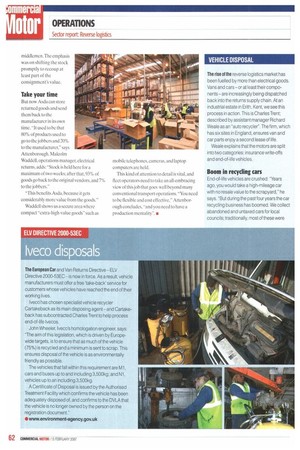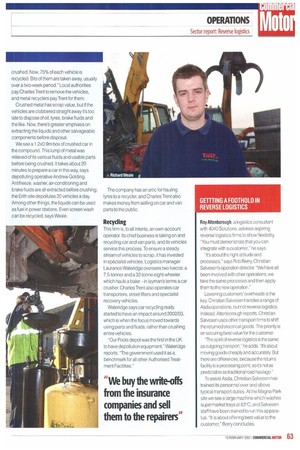VEHICLE DISPOSAL The rise of the reverse logistics market has
Page 62

Page 63

If you've noticed an error in this article please click here to report it so we can fix it.
been fuelled by more than electrical goods. Vans and cars-or at least their components are increasingly being dispatched back into the returns supply chain. At an industrial estate in Erith, Kent, we see this process in action. This is Charles Trent; described by assistant manager Richard VVeale as an "auto recycler". The firm, which has six sites in England, ensures van and car parts enjoy a second lease of life.
Weale explains that the motors are split into two categories: insurance write-offs and end-of-life vehicles.
Boom in recycling cars
End-of-life vehicles are crushed: "Years ago, you would take a high-mileage car with no resale value to the scrapyard," he says. "But during the past four years the car recycling business has boomed. We collect abandoned and untaxed cars for local councils; traditionally, most of these were crushed. Now, 75% of each vehicle is recycled. Bits of them are taken away, usually over a two-week period." Local authorities pay Charles Trent to remove the vehicles, and metal recyclers pay Trent for them.
Crushed metal has scrap value, but if the vehicles are clobbered straight away it's too late to dispose of oil, tyres, brake fluids and the like. Now, there's greater emphasis on extracting the liquids and other salvageable components before disposal.
We see a 1.2x0.9m box of crushed car in the compound. This lump of metal was relieved of its various fluids and usable parts before being crushed. It takes about 20 minutes to prepare a car in this way, says depolluting operative Andrew Golding. Antifreeze, washer, air-conditioning and brake fluids are all extracted before crushing; the Erith site depollutes 20 vehicles a day. Among other things, the liquids can be used as fuel in power stations. Even screen wash can be recycled, says Weale.


























































































































































































